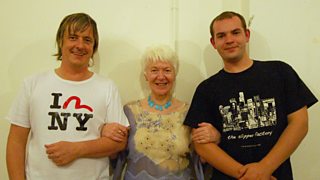5 classified adverts from nearly 100 years ago that teach us how much the world has changed вҖ” and how much it hasnвҖҷt
12 June 2018

The front pages of newspapers used to be filled with classified adverts.
Viewed nowadays, they can provide both a fascinating insight into the realities of life on the day of publication and a thought-provoking perspective on the modern world.
Classified Britain examined one such front page: the Dundee Courier and Argos from 16 November 1922.
Its contents revealed some surprising details about life in Dundee – home of Britain’s jute-making industry – almost 100 years ago. But it also wouldn’t take too much imagination to transpose the adverts’ messages into a 21st Century context.
1. The city was in turmoil
“Great Rally of Labour Supporters”

The paper was published the day after the General Election when Dundee’s Liberal MP, Winston Churchill, lost his seat. The advert alerts Labour supporters to a post-election rally.
Chris Whatley of Dundee University explained, “During the First World War Dundee had boomed because jute was in great demand for sandbags. That demand had collapsed in 1919.
“By 1921 the city’s workforce was on a three day week; wages had been cut by 22%.
“The consequence of that post-war collapse in demand was poverty, difficulty and distress across the city.”
2. There was a gulf between rich and poor
“Furs! Furs! Furs!”
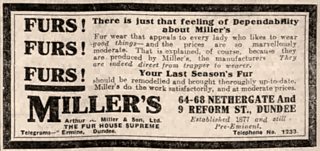
The classifieds reveal the divide between the haves and have-nots; the mill-owners and their workers.
In a city where a large swathe of the workforce was feeling the strain of low wages, adverts such as this one advertising fur coats were aimed at the privileged few.
Writer and broadcaster Billy Kay assessed the situation: “You had a big working class but a tiny oligarchy.
“The poet George Bruce, who worked in Dundee High School in the 1930s, described how young children in Rolls Royces would be delivered to the school. They were aware of their power and their status.”
3. Industry was in decline
“Preparing overseer wanted for jute mills near Calcutta”
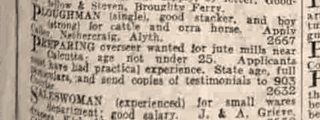
Experienced jute workers were abundant in Dundee and many took their skills to the new mills of India where jute could be produced more cheaply.
Chris Whatley explained, “In a sense [they] played their part in cutting the throat of their fellow citizens because, ultimately, the Calcutta jute industry sees the end of the Dundee jute industry.”
4. Change was coming
“A continuous hot water supply”

Former jute weaver Lily Thomson spent her life working in the mills.
“I lived in a tenement,” she said. “Most people in the tenement were mill workers. There were six of us in one room; fourteen people used the outside toilet. We had no hygiene and you paid for your doctor.”
“In our house we had the range, the kettle was on all the time. There was only cold water [available].”
Amid these difficult conditions faced by tenement residents, hot running water available "at any time, day or night" must have seemed like an unachievable luxury.
5. Religious prejudice existed ... at least elsewhere in Scotland
"Housekeeper required [...] Scotch; Protestant"
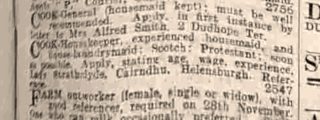
An advert placed by a Helensburgh woman seeks a housekeeper from the Dundee area with two very particular attributes: ‘Scotch’ and ‘Protestant’.
The implication of her request is clear – No Irish catholics need apply.
The Dundee Courier and Argos from 16 November 1922
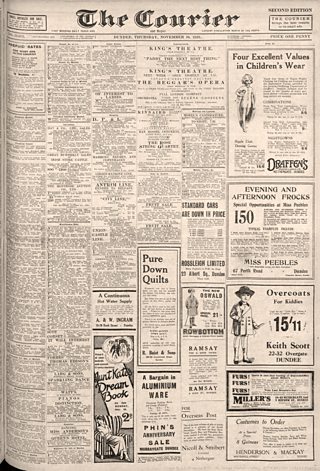
- (3211 x 4730)
Newspaper extracts courtesy of D.C. Thomson & Co. Ltd
-
![]()
Classified Britain
James Naughtie explores history through front page small ads.
DundeeвҖҷs newest attraction

If you think the new V&A Dundee building is a stunning work of art on the outside, .
Ads you definitely wouldnвҖҷt have found in the Courier
Latest features from ҙуПуҙ«ГҪ Scotland
-
![]()
'Wild swimming helps me process the grief of losing my son'
The benefits of cold water therapy.
-
![]()
Winter adventures are appealing, but an expert advises caution
Trips in winter require particular knowledge and skills.
-
![]()
The rescuers: Why volunteers risk their lives in mountain emergencies
Landward meets members of the Cairngorm Mountain Rescue Team.
-
![]()
вҖҳLook for the lightвҖҷ вҖ“ practical tips to help you through another winter with SAD
Useful advice and tips to combat low moods at this time of year.
-
![]()
How you could be a binge drinker without even knowing
Binge drinking is classed as fewer units than many people may realise.
-
![]()
How chocolate biscuits and drama classes helped one man leave prison behind
The healing power of creativity.
-
![]()
'When people believe in you, itвҖҷs life-changing'
Author Graeme Armstrong revisits the man who helped turn his life around.
-
![]()
The 'breath-taking' display of US birds swept on to British soil
Recent storms have brought rare birds to our shores.
-
![]()
Six things we learned about Alan Cumming on Take the Floor (Spoiler: includes accordions)
The actor spoke to Take the Floor's Gary Innes.
-
![]()
How street gangs trap young men in a dangerous cycle of violence
The almost inescapable pull of life in a gang.
-
![]()
Why stylist Gok Wan believes there's no such thing as bad fashion
The fashion expert says we should stop following rules and do what feels right.
-
![]()
Is sending a CV still the right way to apply for a job?
They've been central to job applications for years, but are they worth it?









